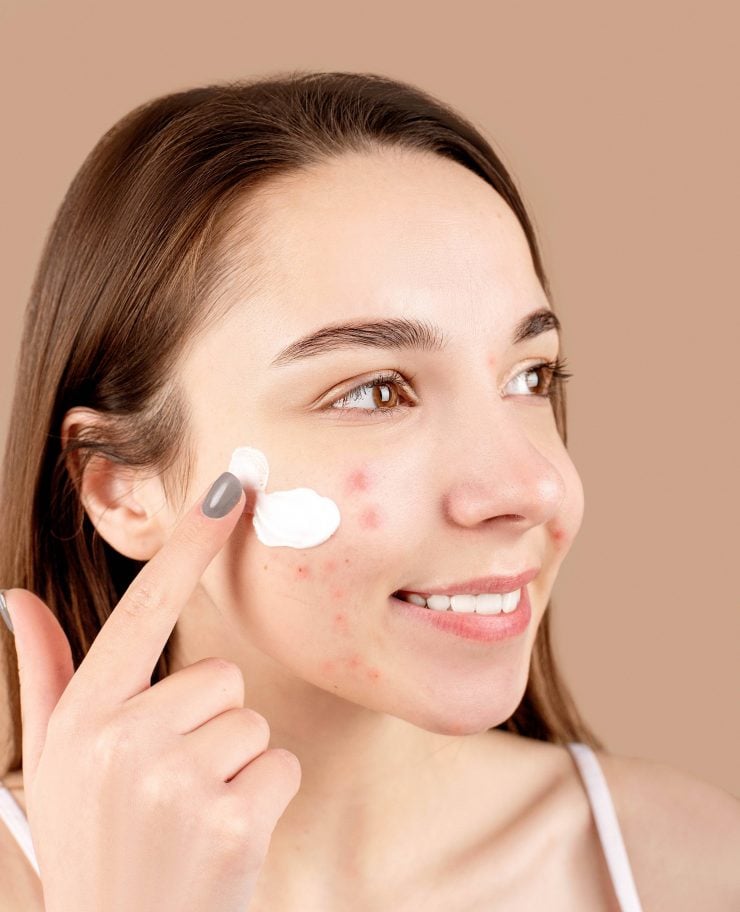But don’t worry—there are gentle yet effective options. The best acne products for sensitive skin include mild cleansers, alcohol-free toners, and spot treatments with low-concentration salicylic acid or benzoyl peroxide ingredients.
Finding the right products may take some trial and error. To reduce the chance of irritation, look for items labeled “non-comedogenic” and “fragrance-free.”
Key Takeaways
● Gentle cleansers and alcohol-free toners are essential for sensitive, acne-prone skin.
● Look for products with low concentrations of acne-fighting ingredients to minimize irritation.
● Always patch-test new products and introduce them gradually into your skincare routine.
Understanding Acne and Sensitive Skin
Acne and sensitive skin often go hand in hand, making finding the right skincare products tricky.
Let’s look at what causes these skin issues and how they relate.
Identifying Sensitive Skin and Acne-Prone Types
Sensitive skin gets irritated easily. It may turn red, sting, or feel tight. Acne-prone skin produces too much oil and gets clogged pores. Some people have both.
Signs of sensitive skin:
● Redness
● Burning sensation
● Itching
● Dryness
Signs of acne-prone skin:
● Oily texture
● Blackheads and whiteheads
● Pimples
● Cysts
If you have both, your skin might react badly to harsh acne treatments.
Role of Sebum and Skin Barrier in Acne
Sebum is the oil your skin makes. It helps protect your skin, but too much can cause problems. Your skin barrier keeps good stuff in and bad stuff out.
In acne-prone skin:
● Oil glands make too much sebum
● Pores get clogged with oil and dead skin cells
● Bacteria grow in the clogged pores
A weak skin barrier lets irritants in more easily. This can make acne worse, especially if you have sensitive skin.
Common Irritants and Acne Triggers
Many things can upset sensitive, acne-prone skin. Some make it red and itchy, and others cause more pimples.
Common irritants:
● Fragrances
● Alcohol
● Harsh soaps
● Hot water
Acne triggers:
● Touching your face
● Stress
● Certain foods
● Hormonal changes
Be careful with acne products. Strong ingredients like benzoyl peroxide can irritate sensitive skin. Look for gentle, non-comedogenic products that won’t clog your pores.
Top Acne Treatments for Sensitive Skin
Caring for acne-prone sensitive skin requires gentle yet effective products. The right ingredients and routine can help clear breakouts without irritating them.
Effective Ingredients for Acne-Prone Sensitive Skin
Look for products with salicylic acid, a gentle exfoliant that unclogs pores. Niacinamide reduces redness and inflammation. Benzoyl peroxide fights acne-causing bacteria but can be harsh, so use low concentrations.
Azelaic acid is great for sensitive skin. It fights acne, redness, and dark spots. Sulfur treats acne without over-drying. Green tea soothes skin while fighting breakouts.
For hydration, try hyaluronic acid and ceramides. These ingredients protect your skin barrier. Zinc oxide in sunscreens calms skin and guards against UV damage.
Crafting a Skincare Routine for Sensitive Skin
Start with a gentle, non-foaming cleanser. Use lukewarm water to avoid irritation.
Pat your face dry with a soft towel.
Apply a lightweight, oil-free moisturizer to damp skin. This locks in hydration.
Wait a few minutes, then use your acne treatment.
Start with a low concentration and use it every other night. Slowly increase as your skin adjusts.
Always finish with SPF during the day.
Use a clay mask once a week to absorb excess oil. Look for ones with calming ingredients like aloe vera.
Avoid harsh scrubs or alcohol-based toners.
